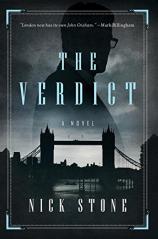The Verdict
Review
The Verdict
As a young attorney, I was first attracted to courtroom-based fiction and nonfiction for the same reason: I wanted to become a good trial attorney. Reading books about real-life cases could show me how great attorneys had succeeded and sometimes blundered. On another level, reading novels with fictional courtroom scenes could improve important communication skills because the language of the courtroom is unique, and the courtroom is a stage where lawyers perform just as actors and actresses. As Nick Stone observes in his outstanding new courtroom novel, a criminal defense lawyer “doesn’t have to believe in your client’s innocence, you only have to make believe you do.”
Many decades have passed since I first stepped into a courtroom, but my love of courtroom fiction continues unabated. Great courtroom novels come along infrequently, and I keep a list that I often hand out on speaking occasions in my community. The last book I added to the list was THE LINCOLN LAWYER, published in 2005; 10 years later, THE VERDICT is my newest addition.
This is a “big trial” novel, taking the reader from the commission of the crime to the verdict and beyond. Americans will find the journey very interesting because the English legal system differs in many important ways from its American counterpart. While we will discuss many of those differences later in this review, we can begin our discussion by noting one important similarity: a vicious and brutal crime with a defendant fighting the overwhelming belief that he is guilty as charged.
"This enjoyable and educational read is one of the best books of the year (or any year) and gets my strongest recommendation."
Vernon James, the son of poor immigrant parents and now a multimillionaire hedge fund manager, is preparing to receive an award as “Ethical Person of the Year.” From page one of THE VERDICT, one thing is crystal clear: Vernon is anything but ethical. In the hotel where he is receiving his award, a young woman is found strangled in his room. Clearly the prime suspect, Vernon is arrested and charged.
In England, different attorneys prepare a case for trial with solicitors performing the investigation and barristers appearing in court. Vernon’s civil attorney hires a prominent firm of barristers where Terry Flynt is employed as a clerk. Clerks do much of the investigatory legwork, and Terry will be tasked with seeking evidence that will help in Vernon’s defense. His lawyers fear Vernon is guilty, but initially it is their goal to hamper the prosecution as much as possible. The tactic is to make it difficult, if not impossible, for the prosecution to meet the burden of proof in a criminal trial --- proof beyond a reasonable doubt.
Terry and Vernon are no strangers. They grew up together in a poor section of London and earned scholarships to Cambridge. Vernon prospered, but Terry flunked out his first year --- in part, he believes, because Vernon falsely accused him of theft. Twenty years later, when their paths cross again, Terry thinks it’s unique karma that he now will be helping to defend a man who he’s convinced helped destroy his life.
Of course, readers know that Vernon is innocent of the charges against him. They also learn that he is a bad person who has committed countless other illegal acts. But the charge against him is murder, and his team of investigators, solicitors and barristers undertake an exhaustive investigation that discovers evidence that he was framed. Along the way, Stone offers readers interesting insight into the English criminal justice system, where the line separating ethical and unethical behavior is more of a tightrope than a line. Walking that line often can be difficult. While the English and American criminal justice systems have many differences, navigating ethical dilemmas is one problem they share.
THE VERDICT culminates in Vernon’s trial in Courtroom One at The Old Bailey. The investigation takes up a substantial portion of the novel’s 500 pages, but the courtroom scenes are riveting and instructive. Readers again will see many differences between English and American law with respect to rules of evidence and defendants’ rights. This enjoyable and educational read is one of the best books of the year (or any year) and gets my strongest recommendation.
Reviewed by Stuart Shiffman on December 11, 2015





